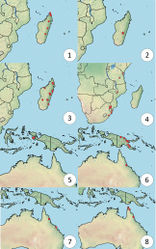Difference between revisions of "Dichoteleas fuscus"
m (Imported from ZooKeys) |
m (1 revision imported) |
(No difference)
| |
Latest revision as of 16:00, 13 October 2023
| Notice: | This page is derived from the original publication listed below, whose author(s) should always be credited. Further contributors may edit and improve the content of this page and, consequently, need to be credited as well (see page history). Any assessment of factual correctness requires a careful review of the original article as well as of subsequent contributions.
If you are uncertain whether your planned contribution is correct or not, we suggest that you use the associated discussion page instead of editing the page directly. This page should be cited as follows (rationale):
Citation formats to copy and paste
BibTeX: @article{Schwartz2023ZooKeys1182, RIS/ Endnote: TY - JOUR Wikipedia/ Citizendium: <ref name="Schwartz2023ZooKeys1182">{{Citation See also the citation download page at the journal. |
Ordo: Hymenoptera
Familia: Scelionidae
Genus: Dichoteleas
Name
Dichoteleas fuscus Schwartz & Van Noort & Johnson, 2023 sp. nov. – Wikispecies link – ZooBank link – Pensoft Profile
Description
Color of head: metallic blue. Hyperoccipital carina: present. Frontal depression: absent. Malar striae: absent. Facial striae: absent. Setation of eyes: absent. Sculpture of frons: smooth above interantennal prominence, areolate laterally. Setation of frons: sparsely setose throughout. Submedian carina: present. Interantennal process: undifferentiated. Central keel: absent. Transverse pronotal carina: present. Color of pronotum: dark brown to black. Pronotal cervical sulcus: absent. Mesepimeral sulcus: absent. Sulcus along mesopleural carina: absent. Mesoscutal suprahumeral sulcus: absent. Mesoscutal humeral sulcus: present as an uninterrupted groove. Median mesoscutal line: absent. Color of mesoscutum: dark brown to black. Sculpture of mesoscutum: rugulose. Notaulus: complete. Visibility of notaulus: unobscured. Parapsidal line: present. Sculpture of mesoscutellum: rugulose. Shape of axillular carinae: without a posteroventral hooklike projection. Color of axillular carina: brown. Sculpture of T3–6: rugulose. Median carina on T1–T4: present.
Diagnosis
This species can be identified by the dorsal median carina (T1–T4 of metasoma) and can be distinguished from D. subcoeruleus and D. fulgidus by the rugulose sculpture of the mesoscutum.
Etymology
The epithet comes from the Latin word for “dusky,” referring to the darker, metallic color of the mesosoma (in comparison to D. fulgidus). This epithet is treated as an adjective.
Distribution
Papua New Guinea (Madang, Morobe, Northern, East Sepik), Australia (Queensland).
Material examined
Holotype, female: Papua New Guinea: NE Finisterre Range, Saidor, Gabumi; OSUC 234417 (BPBM). Paratypes. Australia: 1 male, OSUC 875045 (CNCI). Papua New Guinea: 12 females, 4 males, OSUC 234413–234416, 234422–234424, 234426, 234428–234429 (BPBM), OSUC 875873–875876 (CNCI).
Original Description
- Schwartz, J; Van Noort, S; Johnson, N; 2023: A taxonomic revision of the Old World genus Dichoteleas Kieffer (Hymenoptera, Scelionidae) ZooKeys, 1182: 183-205. doi
Images
|

